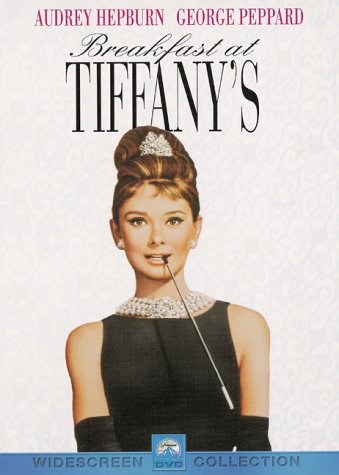Breakfast at Tiffany's review by Jackass Tom
Breakfast at Tiffany’s is about a girl with a flighty personality named Holly Golightly (Audrey Hepburn). She is sexy and stylish and makes her living through the company of men although its never stated exactly what she does in their company. The extent of it is "$50.00 for a powder room", so you can use your imagination. Her decisions in life lack any input from a conscience and are made solely on desire and greed and the men she eye’s have pocketbooks large enough to cover up their aesthetic short-comings. If she needs something, she doesn’t think twice about inconveniencing someone else. Her poor neighbor, Mr Yunioshi (Mickey Rooney) is less a fallback to forgetfulness and more a like a dependency when she forgets her key (which is everytime she leaves her apartment). The poor guy gets buzzed to let her in the building every time. She sounds evil, but damnit you can’t look into Hepburn’s big brown eyes and not see past this selfish, gold digging party girl. She is an inspiration to sororities all over the US.
Her new neighbor Paul (George Pappard) is in a similar situation. His rent and pretty much everything else is paid for by a rich “interior decorator” who makes periodic visits during the day and night. He is a writer by trade but making ends meet by his companionship on the side. He meets Holly the first day he moves in and the two become friends. Sexual tension builds and due to complications (her gold-diggin and past marriage to an Arkansas redneck, his ties to his sugar-momma) they grudgingly fall in love and one side is rejected in act two but then they embrace each other by the end of act three. It’s all very story bookish.
I have not read the book by Truman Capote, but after seeing this movie I am intrigued. Certain sections of the film seem as if they are taken faithfully from the book. Most of the scenes with “Lulumae’s” hillbilly husband and the party to some extent have a visual prescense that I can picture in prose. One thing from the book I do know about is that its very certain that Holly is a prostitute, where in this movie it just seems like she makes her money through the company of men. There is a clever difference which allows the character (and actor) to maintain her grace. As a side note, there is something about this story that reminds me of the Great Gatsby. I feel like equating Holly Golightly to Jay Gatsby: a legendary party host/hostess with a mysterious past that catches up with him/her. Also it is said that Capote wrote the book with Marylin Monroe in mind for Golightly, not Hepburn. I can see Monroe playing this part and probably more true to the character but the part certainly did cement eternal Hepburn's style.
There are certain parts that are inescapably cinematized. The ending is disappointingly happy and upbeat. Not to mention George Pappard is so cardboard throughout the entire movie that you only hope that Holly finds someone as interesting as her. I guess the studio wanted a happy ending so all people in the audience would go, “Awww….” Holly herself seems a bit toned down socially and sexually. Although implied, she never mentions sleeping with any of her “rats” or “super-rats” that pay her “$50 in the powder room.” All in all, for its time it is somewhat racey. Holly does jump into bed with a shirtless Paul, wears nothing but a button-down white shirt around the house, and the mere mention of $50 transactions would make quite a few movie goers of the early 60s blush. I suppose its tone had quite a bit to do with the times and Audrey Hepburn’s classy image.
I was surprised to find that Breakfast at Tiffany’s was directed by Blake Edwards. I always thought of Edwards a silly, slappy director of Peter Sellers movies (every Pink Panther film, plus The Party to name a few). I didn’t think he was capable of making something as stylized, slightly romantic, and even controversial as Breakfast at Tiffany’s. I should have known it was him as soon as I saw Henri Mancini’s name in the credits and saw the sprawling party scene where dozens of comic interactions take place.
All in all, Breakfast at Tiffany’s is pretty good. I wanted to be able to compare it to the book but obviously my brain is missing half of that equation, so I will set it aside for now. Audrey Hepburn is her usual adorable self: prancing around like a little kitten that is up to no good. This is probably her trademark role. (Thinking back to college: how many countless female dorm-room posters of Holly Golightly sucking on a long-stem cigarette were there?) I am sure many young, flighty girls would like to be as outgoing and free-spirited and Hepburn appears in this film. George Pappard is there as a bit of a protagonist but is nothing spectacular. The story is consuming enough at times but seems shifted out of place at other times. This film is worth seeing for Hepburn alone though and is a classic because she (with help from Capote’s typewriter) make it a classic.








8 out of 10 Jackasses blog comments powered by Disqus
Search
Breakfast at Tiffany's

IMDB Link: Breakfast at Tiffany's
DVD Aspect Ratio: 1.85:1
DVD Extras: You get the DVD. Isnt that enough?